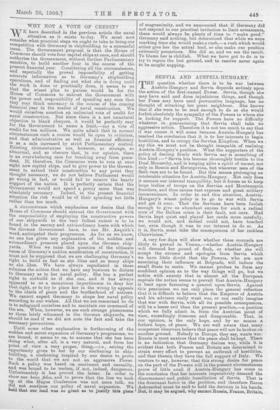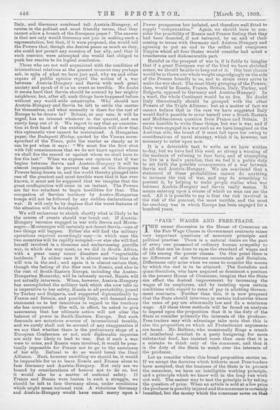SERVIA AND AUSTRIA-HUNGARY. T HE question whether there is to be
war between Austria-Hungary and Servio, depends entirely upon the action of the first-named Power. Servia, though she may have said and done injudicious things, and though her Press may have used provocative language, has no thought of attacking her great, neighbour. She knows that if she were to be mad enough to do so she would forfeit absolutely the sympathy of the Powers to whom she is looking for support. The Powers have no difficulty whatever in guarauteeing that Servia, shall take no aggressive action. Therefore it is not too much to say that if war comes it will come because Austria-Hungary has reached the conclusion that it is to her interests to begin hostilities, and to occupy the Servian Kingdom. When we say this we must not be thought incapable of realising Austria-Hungary's position. What the supporters of the policy of dealing firmly with Servia say is something of this kind :—" Servia, has become thoroughly hostile to the Dual Monarchy, and is keeping alive a spirit of unrest, not only in Bosnia and Herzegovina, but wherever men of the Serb race are to be found. But this means prolonging an intolerable situation for Austria-Hungary. Not only does it menace our internal tranquillity, but it forces us to keep large bodies of troops on the Serviau and Montenegrin frontiers, and thus causes vast expense and great military inconvenience. In order to end this situation, Austria- Hungary's wisest policy is to go to war with Servia and get it over. That the Servians have been foolish enough to give us abundant excuse for such a radical cure of the Balkan crisis is their fault, not ours. Had. Servia kept quiet and played her cards more carefully, we would not, and indeed could not, have touched her, even though it was to our interest to do so. As it is, Servia must take the consequences of her reckless Chauvinism."
A very few days will show whether these counsels are likely to prevail in Vienna,—whether Austria-Hungary will demand her pound of flesh, or whether she will accept the excuses and apologies from Servia. which we have little doubt that the Powers, who are now exercising their influence at Belgrade, will induce the small State to make. We cannot profess to form any confident opinion as to the way things will go, but we notice with anxiety that in almost all the European capitals the notion seems to prevail that Austria-Hungary is bent upon fastening a quarrel upon Servia. Against this pessimism we can only place the general reflection that it is difficult to believe that the Emperor of Austria and his advisers really want war, or can really imagine that war with Servia, with all its possible consequences, will be a lesser evil than the present position,—a position which we fully admit is, from the Austrian point of view, exceedingly tiresome and disagreeable. That, in our opinion, is the only hope, and by no means a forlorn hope, of peace. We are well aware that many competent observers believe that peace will not be broken on another ground. Nobody in Europe, they say, wants war. Russia is most anxious that the peace shall be kept. There is no indication that Germany desires war, while it is evident that both France and Britain are determined to strain every effort to prevent an outbreak of hostilities, and that therein they have the full support of Italy. We venture to say, however, that this strong desire for peace on the part of the Powers will in the present circumstances prove of little avail if Austria-Hungary has come to the conclusion that her interests imperatively demand the disarmament and public humiliation of Servia. That is the dominant factor in the problem, and therefore Baron Aehrenthal must be said to hold the decision in his hands. But, it may be argued, why cannot Russia, France, Britain, Italy, and Germany combined tell Austria-Hungary, of course in the politest and most friendly terms, that they cannot allow a breach of the European peace ? The answer is that not only would Germany not join in making such a representation, but that, if it were proposed, she would tell the Powers that, though she desires peace as much as they, she could not permit any coercion of her ally, and that if such coercion were attempted she would feel obliged to push her resolve to its logical conclusion.
Those who are not well acquainted with the condition of international relations at the present moment may perhaps ask, in spite of what we have just said, why we and other organs of public opinion regard the notion of a war between Austria-Hungary and Servia • with such great anxiety and speak of it as an event so terrible. No doubt it seems hard that Servia should be coerced by her mighty neighbour, but, after all, such things have happened before without any world-wide catastrophe. Why should not Austria-Hungary and Servia be left to settle the matter for themselves, and what necessity is there for the rest of Europe to be drawn in? Britain, at any rate, it will be urged, has no interest whatever in the quarrel, and can surely keep out of it. We regret to say that an examina- tion at first band of the existing situation will show that this optimistic view cannot be maintained. A Hungarian paper, the Budapesti Itirlap, quoted by the Vienna corre- spondent of the Times, puts the matter as clearly as it can be put when it says: "We must fire the first shot with full consciousness that we do not know against whom we shall fire the second or against whom wo shall have to fire the last." When we express our opinion that if war begins between Servia and Austria-Hungary it will be almost impossible to prevent the rest of the European Powers being drawn in, and the world thereby plunged into one of the greatest and most terrible wars that it has ever known, it must not be supposed that we imagine that the great conflagration will come in an instant. The Powers are far too reluctant to begin hostilities for that. The occupation of Servian territory by Austro-Hungarian troops will not be followed by any sudden declarations of war. It will only be by degrees that the worst features of the situation will be developed.
We will endeavour to sketch shortly what is likely to be the course of events should war break out. If Austria- Hungary becomes engaged in war with Servia and Monte- negro—Montenegro will certainly not desert Servia—one of two things will happen. Either she will find the military operations required exceedingly easy—in which case the two countries will be rapidly occupied—or else she will find herself involved in a tiresome and embarrassing guerilla war, in which she may meet, as we did in South Africa, with a great many minor disasters and "regrettable incidents." In either case it is almost certain that she will win in the end ; and again it is almost certain that, though the feeling of the Slav race in Russia, and also in the rest of South-Eastern Europe, including the Austro- Hungarian.Monarchy, will be intensely moved, Russia will not actually intervene. • When, however, Austria-Hungary has accomplished the military task which she now tells us is imperative to her safety, Russia in all probability, joined by Turkey and Bulgaria, and supported diplomatically by France and Britain, and possibly Italy, will demand some statement as to her intentions in regard to the territory she has conquered. She will, in effect, be asked to give assurances that her ultimate action will not alter the balance of power in South-Eastern Europe. But such demands are notorious sources of international trouble, and we surely shall not be accused of any exaggeration if we say that whether there is the preliminary stage of a European Conference or not, such diplomatic inquiries are only too likely to lead to war. But if such a war were to come, and Russia were involved, it would be prac- tically impossible for France not to go to the assistance of her ally. Refusal to do so would break the Dual Alliance. Next, however unwilling we should be, it would be impossible for us to leave Russia and France alone to face Germany and Austria-Hungary. Not only are we bound by considerations of honour not to do so, but it would also be a matter of national safety. If France and Russia were beaten in such a struggle, we should be left to face Germany alone, under conditions which might mean national ruin. A. victorious Germany and Austria-Hungary would have small mercy upon a Power prosperous but isolated, and therefore well fitted to supply "compensation." Again, we should have to con- sider the possibility of Russia and France feeling that they bad been deserted, if not betrayed, by us, and of their coming to terms with Germany and Austria-Hungary and agreeing to put an end to the selfish and overgrown Empire which all four States would consider had acted a treacherous and dishonourable part.
Hateful as the prospect of war is, it is futile to imagine that if a great European war of the kind we have sketched comes, we should be able to keep out of it. Our best chance would be to throw our whole weight ungrudgingly on the side of the Powers friendly to us, and to strain every nerve to make the war short. The most likely grouping of the Powers, thou, would be Russia, France, Britain, Italy, Turkey, and Bulgaria, opposed to Germany and Austria-Hungary. In a word, the whole Continent would be on fire. No doubt Italy theoretically should be grouped with the other Powers of the Triple Alliance; but as a matter of fact we cannot believe that in the case we have suggested Italy would find it possible to sever herself over a South-Eastern and Mediterranean question from France and Britain. It ' seems horrible to write these things, but war is war, and if Italy were engaged in a war such as we have imagined on the _- Austrian side, the brunt of it must fall upon her owing to considerations of naval strategy, which it is, however, not • necessary to enter upon now.
It is a detestable task to write as we have written to-day, but we have had this week so strong a warning of the madness of refusing to face facts, and of attempting to live in a fool's paradise, that we feel it a public duty to set forth the possible consequences of a war between Servia and Austria-Hungary. We are convinced that a statement of these probabilities cannot do anything to increase the risk of war, and may do something to prevent it, by helping to make people realise what war between Anstria-Hungary and Servia really means. It means entering upon a course of which no man can see the end. All it is possible to say is that the risk involved is the risk of the greatest, the most terrible, and the most far-reaching war in which Enrope has been engaged for a hundred years.











































 Previous page
Previous page